Key Findings
In order for the agrivoltaics sector to move from the pilot project stage to more widespread adoption, several policy and regulatory obstacles must be removed.
For the sector to thrive, measures to safeguard farming communities and agricultural production should be a key part of the policy and regulatory reforms that the sector needs.
India can make good use of the policy and legislative responses that early adopter countries have already made to help resolve various legal, financial and regulatory challenges.
Executive Summary
The rapidly developing field of agrivoltaics – combining farming with solar power generation in ways that maintain agricultural productivity – holds special promise for India. A number of research and demonstration projects are already in progress and it has the potential to become an important new player in the country’s renewable energy sector.
This report reviews several features of agrivoltaics that make it especially relevant for India, as well as policy challenges that must be addressed if it is to reach its full potential.
The factors that make the sector well suited to Indian conditions include:
-
The outlook for energy needs and distributed renewable energy infrastructure
-
Geographical characteristics of the solar resource, farmland coverage and land use patterns
-
The capacity to address some of the socioeconomic challenges facing India’s rural sector
-
The advantages of particular agrivoltaic panel configurations for local needs.
In order for the agrivoltaics sector to move from the pilot project stage to more widespread adoption, several policy and regulatory obstacles must be removed. A benefit of having not been amongst the earliest adopter countries is that India can make good use of the policy and legislative responses these countries have already made to help resolve various legal, financial and regulatory challenges.
Lessons learned elsewhere and issues raised by Indian proponents of agrivoltaics form the basis for several recommendations about governance, research and knowledge dissemination, legal issues, incentives for adoption, and the protection of farmers’ interests, farmland and food production.












